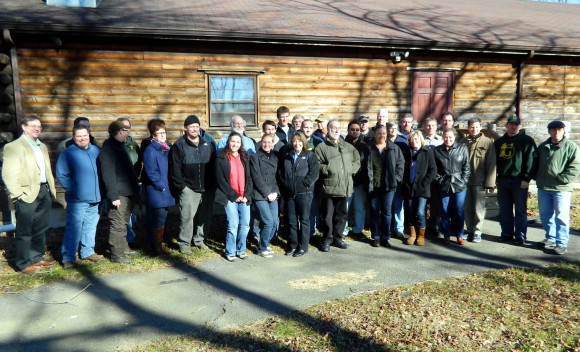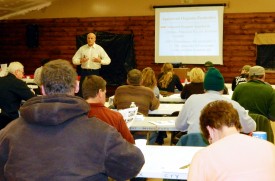
The first class of Organic Land Care Certificate Program participants in New Jersey, pose with organizers from Rutgers Cooperative Extension.
The first such program in New Jersey graduates its first class
Rutgers Cooperative Extension (RCE) graduated 27 New Jersey landscapers and land care providers from its first Organic Land Care Certificate Program in January. Participants completed a rigorous four-day program where they learned new skills related to sustainable, environmentally-friendly land care practices that improve soil health, promote biodiversity and reduce negative impacts on home landscapes as well as New Jersey’s natural resources.
The question of what “organic” actually means can lead to a lot of confusion depending on who you ask. To provide clarity, the federal government developed national organic standards and a certification program identified by the familiar green and black USDA symbol, which certifies that agricultural products meet federal organic standards. However, there are no federal standards for organic land care. In order to educate and assist land care practitioners in determining what is acceptable under an organic program, several organizations have developed their own standards, including the Northeast Organic Farming Association (NOFA) of Connecticut and Oregon Tilth.
According to Michele Bakacs, environmental and resource management agent with RCE of Middlesex and Union counties, organic land care is defined as landscaping without the use of synthetic pesticides, fertilizers or soil amendments. As defined by NOFA, the practice of organic land care is based upon “minimal use of off-site inputs and on management practices that restore, maintain, and enhance ecological harmony and beauty in urban and suburban landscapes and gardens.”
Amy Rowe, environmental and resource management agent with RCE of Essex and Passaic counties, added. “Organic land care practices can contribute to improved water quality in local waterways by reducing nutrient and other chemical inputs that wash off landscaped surfaces during rain events.”
A prevailing misconception is that organic landscaping practices do not work and an organic lawn will end up being a hotbed of weeds and pests. To help dispel this belief, RCE of Middlesex and Essex County worked alongside the Rutgers Organic Land Care Working Group for over a year to research and develop an educational program in organic land care for professional landscapers. Over 20 Rutgers and industry experts helped teach the certificate course, the first of its kind in the state. Topics included site analysis and design, soil health, compost tea, using native plants, rain gardens, lawn care and maintenance, and landscape alternatives to lawns.
Joseph Heckman, extension specialist in soil fertility at Rutgers, who teaches several classes on organic agriculture, spoke about the importance of utilizing the law of return in organic land care, the process of emulating the waste recycling process that naturally occurs in a forest or grassland.
“In the case of organic land care, the law of return principle applies to grass clippings, shade tree leaves, and other yard waste, which can be collected for composting on site or delivered to a commercial composting facility,” said Heckman. “Finished compost can be applied to lawns as a soil fertility supplement,” he added.
The basis of organic land care is the care and restoration of the soil, as well as understanding soil health. Organic land care practices focus on feeding the soil, not the plants, and building up organic matter and nutrients to support the soil food web. The practices of systematically supplying synthetic nitrogen to grass to “green up” the lawn only degrades the soil and damages the plants in the long-term.
William T. Hlubik, agricultural and resource management agent for RCE of Middlesex County, showed the class how to make and utilize compost tea, a liquid rich in soluble nutrients and microorganisms. “Compost tea is of great value for helping to stimulate beneficial microorganisms in the soil, to control and prevent disease problems, and thus encourage a healthier environment for plant roots,” said Hlubik.

Steve Rettke, program associate in ornamentals IPM, shares expertise on managing insects on ornamentals using Integrated Pest Management.
On the final day of the course, a panel of organic land care practitioners that included Richard A. McCoy with Richard A. McCoy Horticultural Services, Inc., Keith Haitz with Hyrdo-Green/Blades Landscaping, and Barry Draycott with Tech Terra Environmental, answered questions about transitioning to organic landscaping, marketing organic land care services, working with suppliers, and determining pricing. “There is no boiler plate for starting an organic landscaping business,” said McCoy. “This is a new area, and you have to figure it out as you go, make your mistakes and learn from them.”
Haitz emphasized the importance of the industry being ready for the emerging organic land care market. “As the awareness for organic products increases, so does the demand,” he said. “The fact of the matter is that organic products, and organic methods are being woven into the fabric of our society and the stage is being set.”
“More than 30 municipalities in New Jersey have enacted bans on synthetic lawn pesticides on public property. Our industry has to be ready for what is coming,” added Haitz.
In order to receive their organic land care certificate, participants were required to pass a 40-question exam at the end of the course. Future certificate courses are being planned, as well as one-day advanced sessions and workshops for homeowners who want to learn how to organically manage their home landscape.
Representatives from the following companies received an organic land care certificate through this course: NaturalScape Inc.; Lawn Control Inc.; NaturaLawn of America; Lawn Masters of New Jersey; AgWorks in the City; Richard A. McCoy Horticultural Services; Landscape Work Inc; Genesis Landscape Contractors; Landscape Design Strategies; Green Edge Tree & Turf; Almstead Tree & Shrub Care; Oasis Backyard Farms; Hydro-Green/ Blades Landscaping; Camberly Gardens; BC Knowles Landscaping Inc.; and Genesis Landscape Contractors.
For more information about the program, contact Bakacs at 732-398-5274 or bakacs@njaes.rutgers.edu or Amy Rowe, environmental and resource management agent with RCE of Essex County, at 973-287-6360 or rowe@njaes.rutgers.edu.

